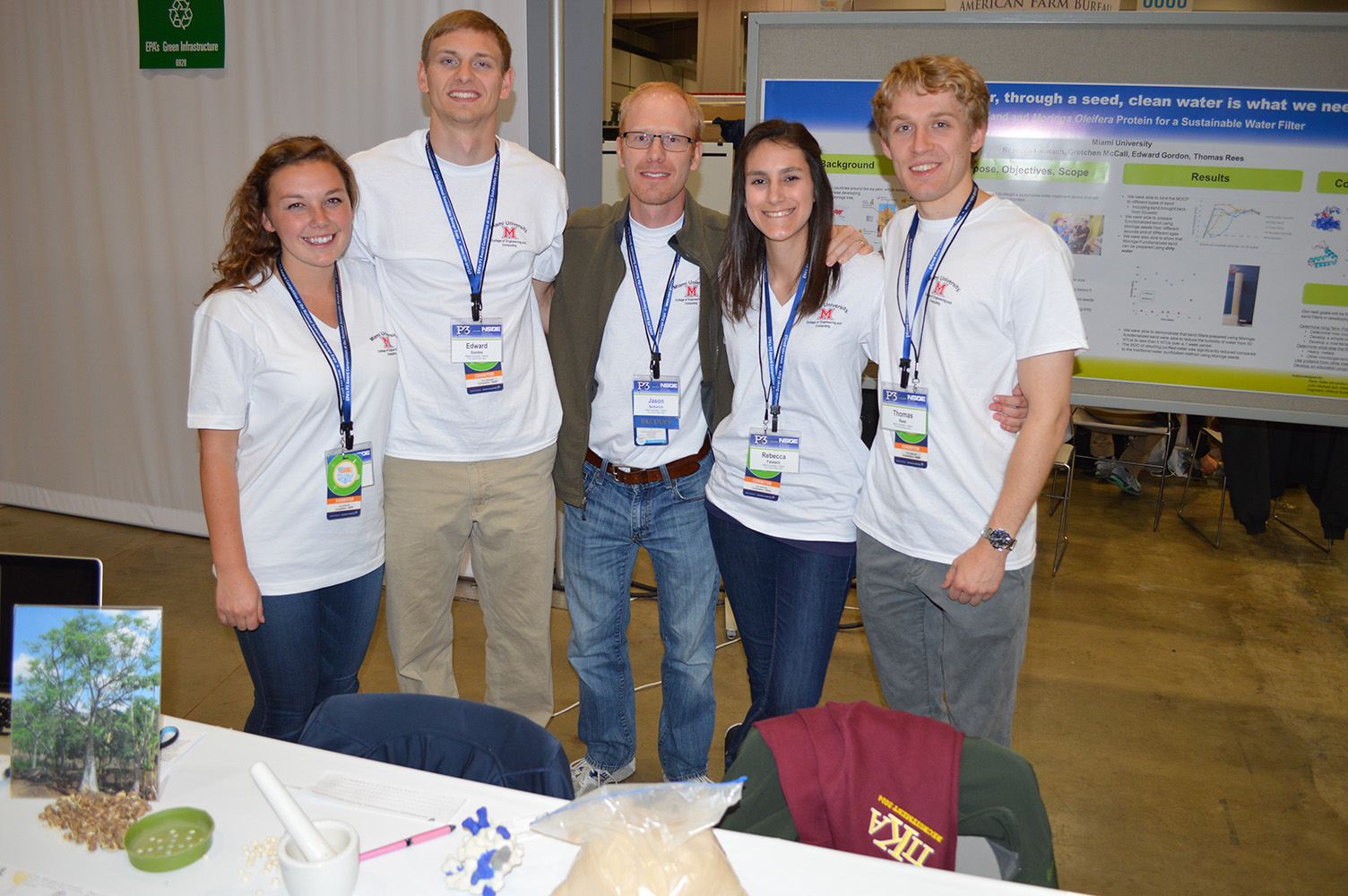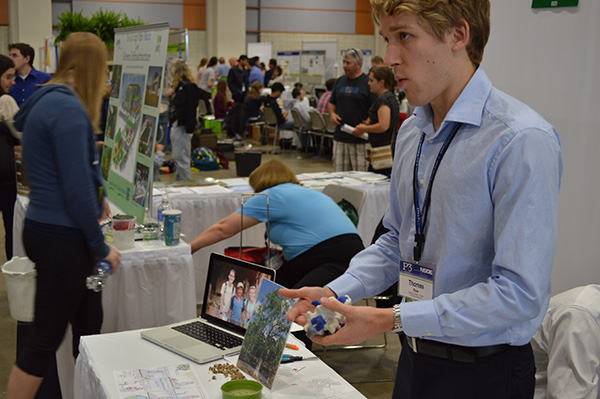
"From a river through a seed": Engineering students showcase sustainable water filter at U.S. EPA's People, Prosperity and the Planet competition

Miami engineering students showcased their sustainable water filter project at the People, Prosperity and the Planet competition held during the National Sustainable Design Expo in Washington, D.C. Left to right: Gretchen McCall, Edward Gordon, Jason Berberich (assistant professor of chemical, paper and biochemical engineering), Rebecca Falatach and Thomas Rees (photo by Ryann Williams, U.S. EPA).
Using sand and seeds from the Moringa oleifera tree, a project designed by a team of Miami engineering students could help clarify and purify water inexpensively in the developing world.
The Miami team was one of 40 university teams nationwide that were each awarded a $15,000 grant in the U.S. EPA's People, Prosperity and the Planet (P3) competition. Grants were awarded during the P3 "Phase I" in the fall for teams' research proposals.
The Phase I grant made the teams eligible to compete in the Phase II competition for the P3 award and funding of up to $90,000 to take their designs to real world application.
The P3 Award competition was held during the National Sustainable Design Expo April 25-27 in Washington, D.C.
"From a river through a seed, clean water is what we need."
The Miami team's project, "Using Sand and Moringa Oleifera Protein for a Sustainable Water Filter," involved the design of a water purification device that couples sand with proteins extracted from the Moringa oleifera seed for enhanced filtration.
The Moringa olefeira tree, native to parts of Africa and Asia and sustainable in developing countries, produces seeds that have an anti-bacterial property. Moringa seeds are also renewable and degrade naturally.
Team members, all seniors, are Rebecca Falatach, bioengineering and chemical engineering double major and management information systems minor; Edward Gordon, bioengineering major; Gretchen McCall, bioengineering major and mechanical engineering minor; and Thomas Rees, chemical engineering major.
They were led by Jason Berberich, assistant professor of chemical, paper and biomedical engineering.
Their project also involved consideration of a range of socio-cultural, economic and environmental inputs to ensure the filter’s long-term viability in the developing world. One of their goals is to introduce this technology to key community leaders in a developing community in Ecuador through contacts established last year by the Miami chapter of Engineers Without Borders.

Senior chemical engineering major Thomas Rees at the National Sustainable Design Expo (photo by Ryann Williams).
The team members "worked very hard on the project, worked every day over the J-term and put in many nights and weekends pushing the project forward," Berberich said. "I am very proud of them."
Students who worked on the original P3 Phase I project proposal and research last year were Jillian Epstein (Miami '13), currently a doctoral student at Carnegie Mellon University; Falatach; David Macko, currently a senior chemical engineering and engineering management double major; and John Michael (Miami '13), currently a doctoral student at Carnegie Mellon.
Epstein was awarded a three-year, $30,000 fellowship last year from the National Science Foundation's (NSF) Graduate Research Fellowship Program to continue research on the Moringa oleifera water filter project at the graduate level.
People, Prosperity and the Planet
The U.S. EPA’s P3 program is a student-design competition where college students can benefit people, promote prosperity and protect the planet by designing environmental solutions that move us toward a sustainable future.
The P3 Award competition is a two-phase team contest. For the first phase, interdisciplinary student teams compete for $15,000 grants. Recipients use the money to research and develop their design projects during the academic year. The final projects include a Phase I project report and a Phase II proposal.
In the spring, all teams submit their reports and proposals, and then bring their projects to Washington, D.C., for judging by a panel of experts convened by the American Association for the Advancement of Science (AAAS). Judging takes place at the annual National Sustainable Design Expo on the National Mall.
Seven teams received the P3 award and were recommended for Phase II funding of a grant up to $90,000 to further develop their project design, implement it in the field and move it to the marketplace.
Berberich intends to enter the P3 competition again next year with a new team and project.
